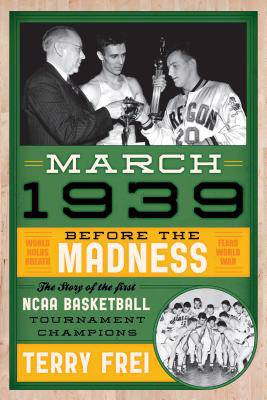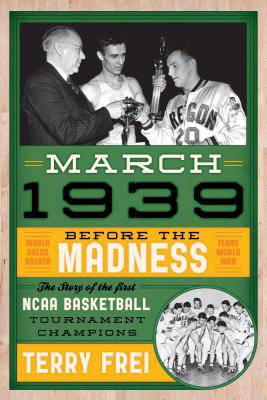
- Afhalen na 1 uur in een winkel met voorraad
- Gratis thuislevering in België vanaf € 30
- Ruim aanbod met 7 miljoen producten
- Afhalen na 1 uur in een winkel met voorraad
- Gratis thuislevering in België vanaf € 30
- Ruim aanbod met 7 miljoen producten
Zoeken
March 1939
Before the Madness--The Story of the First NCAA Basketball Tournament Champions
Terry Frei
Paperback | Engels
€ 22,45
+ 44 punten
Uitvoering
Omschrijving
In 1939, the Oregon Webfoots, coached by the visionary Howard Hobson, stormed through the first NCAA basketball tournament, which was viewed as a risky coast-to-coast undertaking and perhaps only a one-year experiment. Seventy-five years later, following the tournament's evolution into a national obsession, the first champions are still celebrated as "The Tall Firs." They indeed had astounding height along the front line, but with a pair of racehorse guards who had grown up across the street from each other in a historic Oregon fishing town, they also played a revolutionarily fast-paced game.
Author Terry Frei's track record as a narrative historian in such books as the acclaimed Horns, Hogs, and Nixon Coming, plus a personal connection as an Oregon native whose father coached football at the University of Oregon for seventeen seasons, makes him uniquely qualified to tell this story of the first tournament and the first champions, in the context of their times. Plus, Frei long has been a fan of Clair Bee, the Long Island University coach who later in life wrote the Chip Hilton Sports Series books, mesmerizing young readers who didn't know the backstory told here. In 1939, the Bee-coached LIU Blackbirds won the NCAA tournament's rival, the national invitation tournament in New York--then in only its second year, and still under the conflict-of-interest sponsorship of the Metropolitan Basketball Writers Association. Frei assesses both tournaments and, given the myths advanced for many years, his conclusions in many cases are surprising.
Both events unfolded in a turbulent month when it was becoming increasingly apparent that Hitler's belligerence would draw Europe and perhaps the world into another war . . . soon. Amid heated debates over the extent to which America should become involved in Europe's affairs this time, the men playing in both tournaments wondered if they might be called on to serve and fight. Of course, as some of the Webfoots would demonstrate in especially notable fashion, the answer was yes.
It was a March before the Madness.
Author Terry Frei's track record as a narrative historian in such books as the acclaimed Horns, Hogs, and Nixon Coming, plus a personal connection as an Oregon native whose father coached football at the University of Oregon for seventeen seasons, makes him uniquely qualified to tell this story of the first tournament and the first champions, in the context of their times. Plus, Frei long has been a fan of Clair Bee, the Long Island University coach who later in life wrote the Chip Hilton Sports Series books, mesmerizing young readers who didn't know the backstory told here. In 1939, the Bee-coached LIU Blackbirds won the NCAA tournament's rival, the national invitation tournament in New York--then in only its second year, and still under the conflict-of-interest sponsorship of the Metropolitan Basketball Writers Association. Frei assesses both tournaments and, given the myths advanced for many years, his conclusions in many cases are surprising.
Both events unfolded in a turbulent month when it was becoming increasingly apparent that Hitler's belligerence would draw Europe and perhaps the world into another war . . . soon. Amid heated debates over the extent to which America should become involved in Europe's affairs this time, the men playing in both tournaments wondered if they might be called on to serve and fight. Of course, as some of the Webfoots would demonstrate in especially notable fashion, the answer was yes.
It was a March before the Madness.
Specificaties
Betrokkenen
- Auteur(s):
- Uitgeverij:
Inhoud
- Aantal bladzijden:
- 260
- Taal:
- Engels
Eigenschappen
- Productcode (EAN):
- 9781630761998
- Verschijningsdatum:
- 1/02/2016
- Uitvoering:
- Paperback
- Formaat:
- Trade paperback (VS)
- Afmetingen:
- 147 mm x 221 mm
- Gewicht:
- 362 g

Alleen bij Standaard Boekhandel
+ 44 punten op je klantenkaart van Standaard Boekhandel
Beoordelingen
We publiceren alleen reviews die voldoen aan de voorwaarden voor reviews. Bekijk onze voorwaarden voor reviews.











